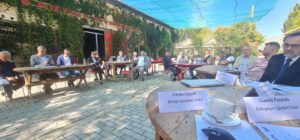NCEI 2021-2023, Working Group III-Session 2: Organic Agriculture (Chapter 11,12 and 28) October 26,2022, Saranda
 European Movement in Albania in cooperation with the Slovak Foreign Policy Association, with the contribution of the Albanian Agribusiness Council (KASH) and with the financial support of SlovakAid held on October 26, 2022, in Saranda the second session of Working Group III (Rural Development and Consumer Protection). This activity was organized within the framework of NCEI 2021-2023 and was focused on Organic Agriculture.
European Movement in Albania in cooperation with the Slovak Foreign Policy Association, with the contribution of the Albanian Agribusiness Council (KASH) and with the financial support of SlovakAid held on October 26, 2022, in Saranda the second session of Working Group III (Rural Development and Consumer Protection). This activity was organized within the framework of NCEI 2021-2023 and was focused on Organic Agriculture.
Harallamb Pandehi, Deputy Chair of Vlora District greeted all the participants and stated that the continuous work in this sector is essential for the economic development of the whole country.
Agim Rrapaj, Chairman of KASH presented a pilot project idea about “Butrinti Ecological Oasis” which will serve as a new economic development model for rural areas (Delvina, Finiq, Himara, Konispol, Saranda). It aims to increase the production of organic products, recycle organic waste and produce fertilizer. Moreover, Rrapaj added that this initiative will help in the development of rural tourism, agro tourism, aqua tourism and agroforestry. Other objectives consist in increasing food quality and consumer safety; increasing the employment of young people; study, consolidation, and improvement of the geopedological structure of the land; the recognition and implementation of the principle of flexibility in the process of approximation of Albanian legislation with that of the EU, especially for organic products. This project aims to bring together state structures, universities and non-governmental organizations. Rrapaj pointed out that this initiative will be based in four pillars: cooperation and coordination; mechanization, innovation and digitalization; finance and microfinance; improvement of the legislation and alignment with that of the EU.
Ján Baršváry, from the Slovak Agriculture and Food Chamber talked about Organic farming CAP support schemes. He said that this farming method aims to produce food using natural substances and processes which have a limited environmental impact. Barsvary explained the EU legislation for organic farming and the role of Central Control and Testing Institute for Agriculture. This institution assesses applications and issues authorization to carry out inspections. It also permits non-ecological inputs into organic farming (fertilizers, plant protection products, feed, cleaning and disinfecting agents) and assesses cases of violation of organic farming rules. The Central Control and Testing Institute for Agriculture manages the list of registered entities, register of inspection organizations, registered area of agricultural land in organic farming, database of bio-seeds in Slovakia, list of fertilizers, soil additives and nutrients allowed in organic farming etc.
Moreover, the expert explained the Support schemes for Organic Farming in Slovakia: The Rural Development Programme of the SR 2014– 2022 and the CAP Strategic Plan of the SR 2023 – 2027. These two schemes have the same amount of payments for conversion to organic farming and payments for maintaining organic farming. Baršváry stated that the conversion period is two years for arable land, vegetables, medicinal and aromatic plants and permanent grasslands, and three years for orchards and vineyards. After the end of the conversion period, the duration of the commitment continues for up to five years. The first Scheme requires the maintenance of permanent grassland in a good condition by re-sowing with certified grass seeds (grass mixtures). The Cap SP 2023-2027 states that only areas of arable land with crops grown for food and fodder purposes and for the production of bio seeds will be supported. Preference will be given to companies that enter into the commitment with the entire area of the company registered in the system of organic farming, are in areas of high natural value, have registered both animal and plant production in the system of organic farming. For CAP 2023-2027, in case of an overwhelming number of applications, selection criteria will be applied based on the size (land area) of the applicant, the location of his land in terms of protected areas, etc. Regarding the system of administration, the expert explained that there are annual calls for application announced by the paying agency. Lastly, he also gave a few examples of cooperation between farmers and institutions in Slovakia.
In the open discussion: The Prefect of the Vlora District, Flamur Mamaj appreciated the organization of this activity and provided some concrete suggestions for further developments in the field of organic agriculture. Aulona Veizi from Vlora Municipality evaluating the contribution of the expert and the best practices of the EU, offered the readiness of the Municipality of Vlora to support farmers and stakeholders in such initiatives. Also, Ramiz Husi, Deputy Head of Saranda Municipality, thanked those present and emphasized the need to increase cooperation with farmers at the local and central level. Other participants asked technical questions regarding the process of application in these schemes.





